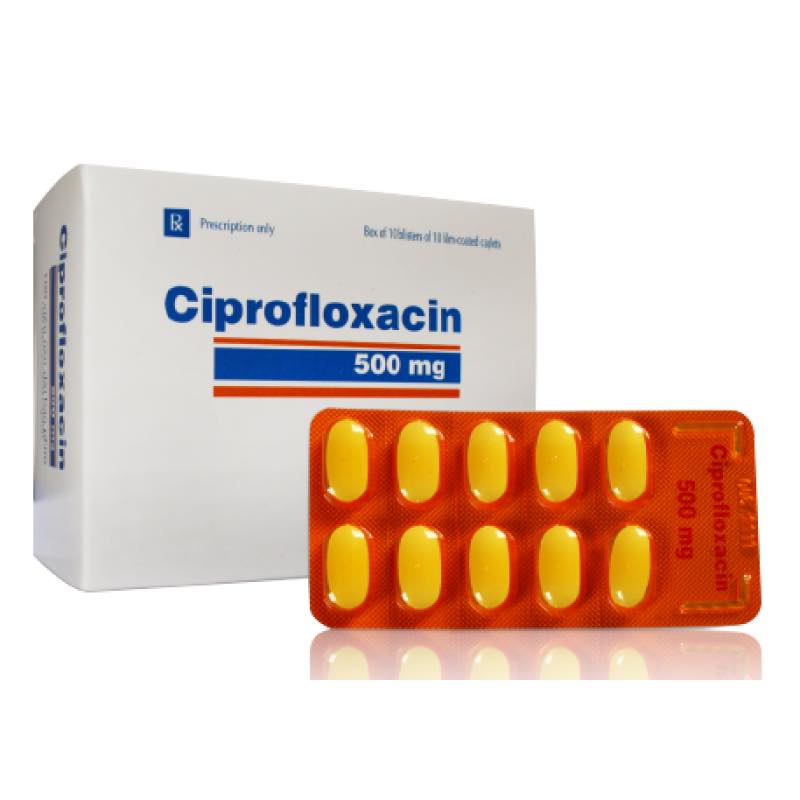What To Avoid When Taking Cipro (ciprofloxacin)

For most people, taking a new medication may mean switching up your lifestyle a bit and that includes the foods you eat. A food-drug interaction means that a specific nutrient or compound within the food changes the way your body metabolizes the medication, and this can either enhance or reduce the dose your body gets, according to Johns Hopkins Medicine. The potential results: an increased risk of side effects, many of which can be dangerous, or the drug not working as it was intended. Before introducing a medication, ask your pharmacist about any food interactions, including with alcohol, and any adjustments you may have to make to your diet.
What is Cipro?
Cipro (ciprofloxacin) is a brand-name prescription antibiotic medication. It’s used to treat infections caused by bacteria. Cipro belongs to a class of antibiotics called fluoroquinolones.
Cipro is effective for treating infections caused by many different types of bacteria. These include bacteria that cause infections in the urinary tract, abdomen, skin, prostate, and bone, as well as other types of infections.
Cipro comes in several forms:
• tablets (Cipro)
• extended-release tablets (Cipro XR)
• powder for oral suspension (Cipro)
Cipro generic name
Cipro is available as a generic drug. The generic drug name is ciprofloxacin.
Ciprofloxacin (generic Cipro) is available in several forms, including:
• oral immediate-release tablet*
• oral extended-release tablet*
• ophthalmic solution (eye drops)
• otic solution (ear drops)
• oral suspension
• solution for injection
How should Cipro (ciprofloxacin) be used?
Ciprofloxacin comes as a tablet, a suspension (liquid), and an extended-release tablet to take by mouth with or without food. The tablets and suspension are usually taken twice a day, and the extended-release tablets are usually taken once a day. When used to treat gonorrhea, the tablets and suspension may be given as a single dose. Take ciprofloxacin at around the same time(s) every day. The length of your treatment depends on the type of infection you have. Your doctor will tell you how long to take ciprofloxacin. Follow the directions on your prescription label carefully, and ask your doctor or pharmacist to explain any part you do not understand. Take ciprofloxacin exactly as directed. Do not take more or less of it or take it more often than prescribed by your doctor.
One type of ciprofloxacin cannot be substituted for another. Be sure that you receive only the type of ciprofloxacin that was prescribed by your doctor. Ask your pharmacist if you have any questions about the type of ciprofloxacin you were given.
Do not take ciprofloxacin with dairy products or calcium-fortified juices alone. However, you may take ciprofloxacin with a meal that includes these foods or drinks.
Swallow the tablets whole; do not crush, or chew them. If your doctor tells you to split the 250-mg or 500-mg tablet, it may be broken in half along the scored line. Swallow the extended-release tablets whole; do not split, crush, or chew them. If you cannot swallow tablets or extended-release tablets whole, tell your doctor.
If you are taking the suspension, shake the bottle very well for 15 seconds before each use to mix the medication evenly. Swallow the correct dose without chewing the granules in the suspension. Close the bottle completely after each use. Do not give the suspension to a patient through a feeding tube.
You should begin feeling better during the first few days of your treatment with ciprofloxacin. If your symptoms do not improve or if they get worse, call your doctor. If you are being treated for a urinary tract infection, call your doctor if you develop fever or back pain during or after your treatment. These symptoms may be signs that your infection is worsening.
Take ciprofloxacin until you finish the prescription, even if you feel better. Do not stop taking ciprofloxacin without talking to your doctor unless you experience certain serious side effects. If you stop taking ciprofloxacin too soon or if you skip doses, your infection may not be completely treated and the bacteria may become resistant to antibiotics.

What To Avoid When Taking Cipro (ciprofloxacin)
Avoid the following foods, supplements, and drinks when taking Cipro (ciprofloxacin):
- Milk
- Yogurt
- Calcium-fortified foods (e.g., cereal, juice)
- Cheese
- Alcohol
- Grapefruit
Taking Cipro (ciprofloxacin) with these foods and drinks can affect how the medication is absorbed, increase the risk or severity of side effects, and promote the development of resistance.
If you must take them, leave a gap of at least 2 hours between taking Cipro (ciprofloxacin) and having this type of food and drink. Drink plenty of fluids while you are using Cipro (ciprofloxacin). Drinking extra water will help prevent some unwanted effects of ciprofloxacin.
Ciprofloxacin could also make you sunburn more easily. Avoid sunlight or tanning beds. Wear protective clothing and use sunscreen (SPF 30 or higher) when you are outdoors. Tell your doctor if you have severe burning, redness, itching, rash, or swelling after being in the sun.
Avoid driving or hazardous activity until you know how ciprofloxacin will affect you. Your reactions could be impaired.
Can I eat eggs while taking Cipro (ciprofloxacin)?
Yes, you can eat eggs with Cipro (ciprofloxacin). Eggs do not contain high levels of calcium or other vitamins and minerals that can affect how your body absorbs ciprofloxacin (Cipro).
What are the side effects of Cipro (ciprofloxacin)?
Cipro (ciprofloxacin) may cause side effects. Tell your doctor if any of these symptoms are severe or do not go away:
• nausea
• vomiting
• stomach pain
• heartburn
• diarrhea
• vaginal itching and/or discharge
• pale skin
• unusual tiredness
• sleepiness
If you experience any of the following symptoms, stop taking ciprofloxacin and call your doctor immediately or get emergency medical help:
• severe diarrhea (watery or bloody stools) that may occur with or without fever and stomach cramps (may occur up to 2 months or more after your treatment)
• rash
• hives
• itching
• peeling or blistering of the skin
• fever
• swelling of the eyes, face, mouth, lips, tongue, throat, hands, feet, ankles, or lower legs
• hoarseness or throat tightness
• difficulty breathing or swallowing
• ongoing or worsening cough
• yellowing of the skin or eyes; pale skin; dark urine; or light-colored stool
• extreme thirst or hunger; pale skin; feeling shaky or trembling; fast or fluttering heartbeat; sweating; frequent urination; trembling; blurred vision; or unusual anxiety
• fainting or loss of consciousness
• decreased urination
• sudden pain in the chest, stomach, or back
Cipro (ciprofloxacin) may cause problems with bones, joints, and tissues around joints in children. Ciprofloxacin should not normally be given to children younger than 18 years of age unless they have certain serious infections that cannot be treated with other antibiotics or they have been exposed to plague or anthrax in the air. If your doctor prescribes ciprofloxacin for your child, be sure to tell the doctor if your child has or has ever had joint-related problems. Call your doctor if your child develops joint problems such as pain or swelling while taking ciprofloxacin or after treatment with ciprofloxacin.
Talk to your doctor about the risks of taking ciprofloxacin or giving ciprofloxacin to your child.
Ciprofloxacin may cause other side effects. Call your doctor if you have any unusual problems while taking this medication.
If you experience a serious side effect, you or your doctor may send a report to the Food and Drug Administration’s (FDA) MedWatch Adverse Event Reporting program online (http://www.fda.gov/Safety/MedWatch) or by phone (1-800-332-1088).
You may find useful information on Is Ciprofloxacin Safe During Pregnancy?





